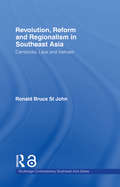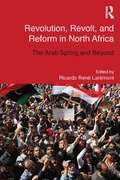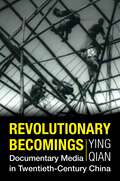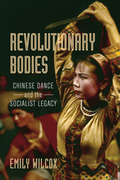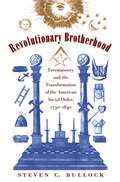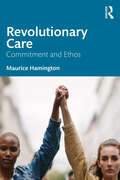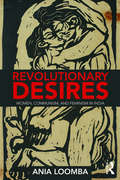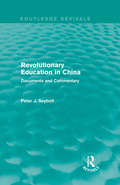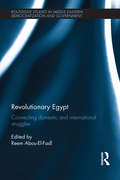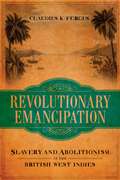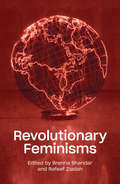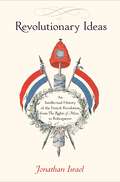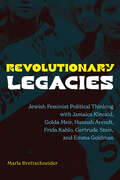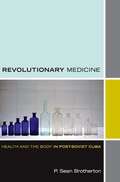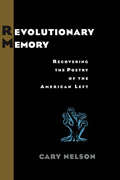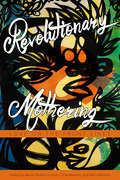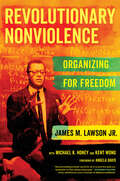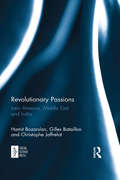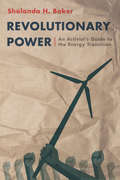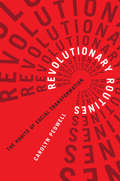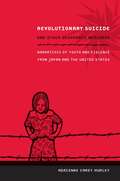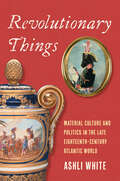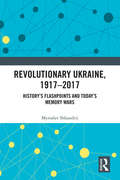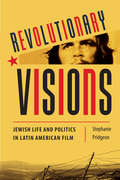- Table View
- List View
Revolution, Reform and Regionalism in Southeast Asia: Cambodia, Laos and Vietnam (Routledge Contemporary Southeast Asia Series #Vol. 8)
by Ronald Bruce St JohnBased on research carried out over the three decades, this book compares the post-war political economies of Cambodia, Laos and Vietnam in the context of their individual and collective impact on contemporary efforts at regional integration. The author highlights the different paths to reform taken by the three neighbours and the effect this has had on regional plans for economic development through the ASEAN and the Greater Mekong Subregion. Through its comparative analysis of the reforms implemented by Cambodia, Laos and Vietnam over the last thirty years, the book draws attention to parallel themes of continuity and change. The author discusses how the three states have demonstrated related characteristics whilst at the same time making different modifications in order to exploit the unique strengths of their individual cultures. Contributing to the contemporary debate over the role of democratic reform in promoting economic development, the book provides a detailed account of the political economies of three states at the heart of Southeast Asia.
Revolution, Revolt and Reform in North Africa: The Arab Spring and Beyond (Routledge Studies in Middle Eastern Democratization and Government)
by Ricardo René LarémontProviding an account of the recent revolutions or reform movements that constituted part of the Arab Spring, this book focuses on these transformative processes in a North African context. Whilst the longer term outcomes of the Arab Spring revolts are not entirely clear, the revolutionary or reform processes in North Africa are further along than the events taking place in Levant or the Arabian Peninsula, elections having now been held in the post-revolutionary/ post-revolt states. Understanding and examining North African events has become critical as the countries in question are part of Mare Nostrum; events in North Africa inevitably have effects in Europe. Using examples from Tunisia, Egypt, Libya, Morocco and Algeria, Revolution, Revolt and Reform in North Africa provides an insider scholar’s account of these recent revolutions or reform movements. One of the first attempts at undertaking an analysis of possible transitions to democracy in the region, this book is a valuable resource for students and researchers with an interest in the Middle East, Political Science or contemporary affairs in general.
Revolutionary Becomings: Documentary Media in Twentieth-Century China (Investigating Visible Evidence: New Challenges for Documentary)
by Ying QianFrom the toppling of the Qing Empire in 1911 to the political campaigns and mass protests in the Mao and post-Mao eras, revolutionary upheavals characterized China’s twentieth century. In Revolutionary Becomings¸ Ying Qian studies documentary film as an “eventful medium” deeply embedded in these upheavals and as a prism to investigate the entwined histories of media and China’s revolutionary movements.With meticulous historical excavation and attention to intermedial practices and transnational linkages, Qian discusses how early media practitioners at the turn of the twentieth century intermingled with rival politicians and warlords as well as civic and business organizations. She reveals the foundational role documentary media played in the Chinese Communist Revolution as a bridge between Marxist theories and Chinese historical conditions. In considering the years after the Communist Party came to power, Qian traces the dialectical relationships between media practice, political relationality, and revolutionary epistemology from production campaigns during the Great Leap Forward to the “class struggles” during the Cultural Revolution and the reorganization of society in the post-Mao decade. Exploring a wide range of previously uninvestigated works and intervening in key debates in documentary studies and film and media history, Revolutionary Becomings provides a groundbreaking assessment of the significance of media to the historical unfolding and actualization of revolutionary movements.
Revolutionary Bodies: Chinese Dance and the Socialist Legacy
by Emily WilcoxA free ebook version of this title is available through Luminos, University of California Press’s Open Access publishing program. Visit www.luminosoa.org to learn more. This book is freely available in an open access edition thanks to TOME (Toward an Open Monograph Ecosystem)—a collaboration of the Association of American Universities, the Association of University Presses, and the Association of Research Libraries. Learn more at the TOME website, available at: openmonographs.org.Revolutionary Bodies is the first English-language primary source–based history of concert dance in the People’s Republic of China. Combining over a decade of ethnographic and archival research, Emily Wilcox analyzes major dance works by Chinese choreographers staged over an eighty-year period from 1935 to 2015. Using previously unexamined film footage, photographic documentation, performance programs, and other historical and contemporary sources, Wilcox challenges the commonly accepted view that Soviet-inspired revolutionary ballets are the primary legacy of the socialist era in China’s dance field. The digital edition of this title includes nineteen embedded videos of selected dance works discussed by the author.
Revolutionary Brotherhood
by Steven C. BullockIn the first comprehensive history of the fraternity known to outsiders primarily for its secrecy and rituals, Steven Bullock traces Freemasonry through its first century in America. He follows the order from its origins in Britain and its introduction into North America in the 1730s to its near-destruction by a massive anti-Masonic movement almost a century later and its subsequent reconfiguration into the brotherhood we know today. With a membership that included Benjamin Franklin, George Washington, Paul Revere, and Andrew Jackson, Freemasonry is fascinating in its own right, but Bullock also places the movement at the center of the transformation of American society and culture from the colonial era to the rise of Jacksonian democracy. Using lodge records, members' reminiscences and correspondence, and local and Masonic histories, Bullock links Freemasonry with the changing ideals of early American society. Although the fraternity began among colonial elites, its spread during the Revolution and afterward allowed it to play an important role in shaping the new nation's ideas of liberty and equality. Ironically, however, the more inclusive and universalist Masonic ideas became, the more threatening its members' economic and emotional bonds seemed to outsiders, sparking an explosive attack on the fraternity after 1826. American History
Revolutionary Care: Commitment and Ethos
by Maurice HamingtonWritten by one of the world’s most respected care scholars, Revolutionary Care provides original theoretical insights and novel applications to offer a comprehensive approach to care as personal, political, and revolutionary. The text has nine chapters divided into two major sections. Section 1, "Thinking About Better Care," offers four theoretical chapters that reinforce the primacy of care as a moral ideal worthy of widespread commitment across ideological and cultural differences. Unlike other moral approaches, care is framed as a process morality and provides a general trajectory that can only determine the best course of action in the moment/context of need. Section 2, "Invitations and Provocations: Imagining Transformative Possibilities," employs four case studies on toxic masculinity, socialism and care economy, humanism and posthumanism, pacifism, and veganism to demonstrate the radical and revolutionary nature of care. Exploring the thinking and writing of many disciplines, including authors of color, queer scholars, and indigenous thinkers, this book is an exciting and cutting-edge contribution to care ethics scholarship as well as a useful teaching resource.
Revolutionary Desires: Women, Communism, and Feminism in India
by Ania LoombaRevolutionary Desires examines the lives and subjectivities of militant-nationalist and communist women in India from the late 1920s, shortly after the communist movement took root, to the 1960s, when it fractured. This close study demonstrates how India's revolutionary women shaped a new female – and in some cases feminist – political subject in the twentieth century, in collaboration and contestation with Indian nationalist, liberal-feminist, and European left-wing models of womenhood. Through a wide range of writings by, and about, revolutionary and communist women, including memoirs, autobiographies, novels, party documents, and interviews, Ania Loomba traces the experiences of these women, showing how they were constrained by, but also how they questioned, the gendered norms of Indian political culture. A collection of carefully restored photographs is dispersed throughout the book, helping to evoke the texture of these women’s political experiences, both public and private. Revolutionary Desires is an original and important intervention into a neglected area of leftist and feminist politics in India by a major voice in feminist studies.
Revolutionary Education in China: Documents and Commentary (Routledge Revivals)
by Peter J. SeyboltOriginally published in 1973, this title analyses revolutionary changes in the Chinese education system and illustrates China’s radical departure from both traditional and Western goals. In his extensive introduction, Peter J. Seybolt puts the transformation of education in the context of China’s socio-economic development and offers insight into why educational reform is at the heart of Chinese society’s radical progress. Additionally, this volume offers valuable historical background as well as a biographical guide and a glossary allowing for a fuller understanding of both historical and modern issues. This is an ideal title for students interested in Asian Studies and History.
Revolutionary Egypt: Connecting Domestic and International Struggles (Routledge Studies in Middle Eastern Democratization and Government)
by Reem Abou-El-FadlIn 2011 the world watched as Egyptians rose up against a dictator. Observers marveled at this sudden rupture, and honed in on the heroes of Tahrir Square. Revolutionary Egypt analyzes this tumultuous period from multiple perspectives, bringing together experts on the Middle East from disciplines as diverse as political economy, comparative politics and social anthropology. Drawing on primary research conducted in Egypt and across the world, this book analyzes the foundations and future of Egypt’s revolution. Considering the revolution as a process, it looks back over decades of popular resistance to state practices and predicts the waves still to come. It also confidently places Egypt’s revolutionary process in its regional and international contexts, considering popular contestation of foreign policy trends as well as the reactions of external actors. It draws connections between Egyptians’ struggles against domestic despotism and their reactions to regional and international processes such as economic liberalization, Euro-American interventionism and similar struggles further afield. Revolutionary Egypt is an essential resource for scholars and students of social movements and revolution, comparative politics, and Middle East politics, in particular Middle East foreign policy and international relations.
Revolutionary Emancipation: Slavery and Abolitionism in the British West Indies (Antislavery, Abolition, and the Atlantic World)
by Claudius K. FergusSkillfully weaving an African worldview into the conventional historiography of British abolitionism, Claudius K. Fergus presents new insights into one of the most intriguing and momentous episodes of Atlantic history. In Revolutionary Emancipation, Fergus argues that the 1760 rebellion in Jamaica, Tacky's War -- the largest and most destructive rebellion of enslaved peoples in the Americas prior to the Haitian Revolution -- provided the rationale for abolition and reform of the colonial system.Fergus shows that following Tacky's War, British colonies in the West Indies sought political preservation under state-regulated amelioration of slavery. He further contends that abolitionists' successes -- from partial to general prohibition of the slave trade -- hinged more on the economic benefits of creolizing slave labor and the costs of preserving the colonies from destructive emancipation rebellions than on a conviction of justice and humanity for Africans. In the end, Fergus maintains, slaves' commitment to revolutionary emancipation kept colonial focus on reforming the slave system. His study carefully dissects new evidence and reinterprets previously held beliefs, offering historians the most compelling arguments for African agency in abolitionism.
Revolutionary Feminisms: Conversations on Collective Action and Radical Thought
by Brenna Bhandar Rafeef ZiadahA unique book, tracing forty years of anti-racist feminist thought In a moment of rising authoritarianism, climate crisis, and ever more exploitative forms of neoliberal capitalism, there is a compelling and urgent need for radical paradigms of thought and action. Through interviews with key revolutionary scholars, Bhandar and Ziadah present a thorough discussion of how anti-racist, anti-capitalist feminisms are crucial to building effective political coalitions. Collectively, these interviews with leading scholars including Angela Y. Davis, Silvia Federici, and many others, trace the ways in which black, indigenous, post-colonial and Marxian feminisms have created new ways of seeing, new theoretical frameworks for analysing political problems, and new ways of relating to one another. Focusing on migration, neo-imperial militarism, the state, the prison industrial complex, social reproduction and many other pressing themes, the range of feminisms traversed in this volume show how freedom requires revolutionary transformation in the organisation of the economy, social relations, political structures, and our psychic and symbolic worlds. The interviews include Avtar Brah, Gail Lewis and Vron Ware on Diaspora, Migration and Empire. Himani Bannerji, Gary Kinsman, Leanne Betasamosake Simpson, and Silvia Federici on Colonialism, Capitalism, and Resistance. Ruth Wilson Gilmore, Avery F. Gordon and Angela Y. Davis on Abolition Feminism.
Revolutionary Ideas: An Intellectual History of the French Revolution from The Rights of Man to Robespierre
by Jonathan IsraelHow the Radical Enlightenment inspired and shaped the French RevolutionHistorians of the French Revolution used to take for granted what was also obvious to its contemporary observers—that the Revolution was shaped by the radical ideas of the Enlightenment. Yet in recent decades, scholars have argued that the Revolution was brought about by social forces, politics, economics, or culture—almost anything but abstract notions like liberty or equality. In Revolutionary Ideas, one of the world's leading historians of the Enlightenment restores the Revolution’s intellectual history to its rightful central role. Drawing widely on primary sources, Jonathan Israel shows how the Revolution was set in motion by radical eighteenth-century doctrines, how these ideas divided revolutionary leaders into vehemently opposed ideological blocs, and how these clashes drove the turning points of the Revolution.In this compelling account, the French Revolution stands once again as a culmination of the emancipatory and democratic ideals of the Enlightenment. That it ended in the Terror represented a betrayal of those ideas—not their fulfillment.
Revolutionary Legacies: Jewish Feminist Political Thinking with Jamaica Kincaid, Golda Meir, Hannah Arendt, Frida Kahlo, Gertrude Stein, and Emma Goldman (SUNY series in Feminist Criticism and Theory)
by Marla BrettschneiderThis book provides a timely new transnational lineage of Jewish feminist revolutionary legacies. Using extensive research, deep thinking, and a bold methodology, Marla Brettschneider tousles with a host of anti-colonial, feminist, anti-racist, and queer troublemakers—Jamaica Kincaid, Golda Meir, Hannah Arendt, Frida Kahlo, Gertrude Stein, and Emma Goldman. Brettschneider brings together these feisty women's lives, work, politics, thinking, and art to wrestle with big questions: How can we make our lives, individually and collectively, in our diversity as Jews and in grounded solidarity with others? How do these women bring out otherwise unidentified, unnamed, and underexamined issues in Jewish studies, feminism, politics, and a range of critical theories? Revolutionary Legacies invites Jews, feminists, anti-racists, and all manner of justice seekers to think, and create common cause, with these rabblerousers.
Revolutionary Medicine: Health and the Body in Post-Soviet Cuba
by P. Sean BrothertonRevolutionary Medicine is a richly textured examination of the ways that Cuba's public health care system has changed during the past two decades and of the meaning of those changes for ordinary Cubans. Until the Soviet bloc collapsed in 1989, socialist Cuba encouraged citizens to view access to health care as a human right and the state's responsibility to provide it as a moral imperative. Since the loss of Soviet subsidies and the tightening of the U.S. economic embargo, Cuba's government has found it hard to provide the high-quality universal medical care that was so central to the revolutionary socialist project. In Revolutionary Medicine, P. Sean Brotherton deftly integrates theory and history with ethnographic research in Havana, including interviews with family physicians, public health officials, research scientists, and citizens seeking medical care. He describes how the deterioration of health and social welfare programs has led Cubans to seek health care through informal arrangements, as well as state-sponsored programs. Their creative, resourceful pursuit of health and well-being provides insight into how they navigate, adapt to, and pragmatically cope with the rapid social, economic, and political changes in post-Soviet Cuba.
Revolutionary Memory: Recovering the Poetry of the American Left
by Cary NelsonRevolutionary Memory is the most important book yet to be published about the vital tradition of leftwing American Poetry. As Cary Nelson shows, it is not only our image of the past but also our sense of the present and future that changes when we recover these revolutionary memories. Making a forceful case for political poetry as poetry, Nelson brings to bear his extraordinary knowledge of American poets, radical movements, and social struggles in order to bring out an undervalued strength in a literature often left at the canon's edge. Focused in part of the red decade of the 1930s, Revolutionary Memory revitalizes biographical criticism for writers on the margin and shows us for the first time how progressive poets fused their work into a powerful chorus of political voices. Richly detailed and beautifully illustrated with period engravings and woodcuts, Revolutionary Memory brings that chorus dramatically to life and set a cultural agenda for future work.
Revolutionary Mothering: Love on the Front Lines
by Mai'A Williams Loretta J RossAn anthology that gives access to the voices of mothers of color and marginalized mothers Revolutionary Mothering: Love on the Frontlines is an anthology that centers mothers of color and marginalized mothers' voices—women who are in a world of necessary transformation. The challenges faced by movements working for antiviolence, anti-imperialist, and queer liberation, as well as racial, economic, reproductive, gender, and food justice are the same challenges that marginalized mothers face every day. Motivated to create spaces for this discourse because of the authors' passionate belief in the power of a radical conversation about mothering, they have become the go-to people for cutting-edge inspired work on this topic for an overlapping committed audience of activists, scholars, and writers. Revolutionary Mothering is a movement-shifting anthology committed to birthing new worlds, full of faith and hope for what we can raise up together. Contributors include alba onofrio, Alexis Pauline Gumbs, Ariel Gore, Arielle Julia Brown, Autumn Brown, Cheryl Boyce-Taylor, China Martens, Christy NaMee Eriksen, Claire Barrera, Cynthia Dewi Oka, Esteli Juarez Boyd, Fabielle Georges, Fabiola Sandoval, Gabriela Sandoval, H. Bindy K. Kang, Irene Lara, June Jordan, Karen Su, Katie Kaput, Layne Russell, Lindsey Campbell, Lisa Factora-Borchers, Loretta J. Ross, Mai'a Williams, Malkia A. Cyril, Mamas of Color Rising, Micaela Cadena, Noemi Martinez, Norma A. Marrun, Panquetzani, Rachel Broadwater, Sumayyah Talibah, Tara CC Villaba, Terri Nilliasca, tk karakashian tunchez, Victoria Law, and Vivian Chin.
Revolutionary Nonviolence: Organizing for Freedom
by James M. Lawson JrA persuasive account of the philosophy and power of nonviolence organizing, and a resource for building and sustaining effective social movements. Despite the rich history of nonviolent philosophy, many people today are unfamiliar with the basic principles and practices of nonviolence––even as these concepts have guided so many direct-action movements to overturn forms of racial apartheid, military and police violence, and dictatorships around the world. Revolutionary Nonviolence is a crucial resource on the long history of nonviolent philosophy through the teachings of Rev. James M. Lawson Jr., one of the great practitioners of revolution through deliberate and sustained nonviolence. His ongoing work demonstrates how we can overcome violence and oppression through organized direct action, presenting a powerful roadmap for a new generation of activists. Rev. Lawson’s work as a theologian, pastor, and social-change activist has inspired hope and liberation for more than sixty years. To hear and see him speak is to experience the power of the prophetic tradition in the African American and social gospel. In Revolutionary Nonviolence, Michael K. Honey and Kent Wong reflect on Rev. Lawson's talks and dialogues, from his speeches at the Nashville sit-in movement in 1960 to his lectures in the current UCLA curriculum. This volume provides a comprehensive introduction to Rev. Lawson's teachings on how to center nonviolence in successfully organizing for change.
Revolutionary Passions: Latin America, Middle East and India
by Christophe Jaffrelot Hamit Bozarslan Gilles BataillonEurope has been the chief arena of revolutionary passions since the end of the eighteenth century. During this same period, and right up to the beginning of the twenty-first century, the non-European world, too, has resonated with coup attempts and revolutionary turmoil. How does one begin to understand these revolutionary passions? To what extent are they influenced by European matrices? Have these revolutions also themselves resulted in ‘exportable models’? Three French writers look at three continents—Latin America, the Middle East and India and interrogate the revolution, with reference to and dialogue with the definitive work of Francois Furet, who wrote The Passing of an Illusion: The Idea of Communism in the Twentieth Century. Interestingly, the original French book Passions révolutionnaires was written in 1995, just after the fall of the Berlin wall. Whether nationalist, religious, proletarian, international, anti-colonial or simply liberty and equality, whether violent or fought passively, the Revolution as a concept and a fact, whether past, present or future, remains a critical reference point for our societies.
Revolutionary Power: An Activist's Guide to the Energy Transition
by Shalanda BakerIn September 2017, Hurricane Maria hit Puerto Rico, completely upending the energy grid of the small island. The nearly year-long power outage that followed vividly shows how the new climate reality intersects with race and access to energy. The island is home to brown and black US citizens who lack the political power of those living in the continental US. As the world continues to warm and storms like Maria become more commonplace, it is critical that we rethink our current energy system to enable reliable, locally produced, and locally controlled energy without replicating the current structures of power and control.In Revolutionary Power, Shalanda Baker arms those made most vulnerable by our current energy system with the tools they need to remake the system in the service of their humanity. She argues that people of color, poor people, and indigenous people must engage in the creation of the new energy system in order to upend the unequal power dynamics of the current system.Revolutionary Power is a playbook for the energy transformation complete with a step-by-step analysis of the key energy policy areas that are ripe for intervention. Baker tells the stories of those who have been left behind in our current system and those who are working to be architects of a more just system. She draws from her experience as an energy-justice advocate, a lawyer, and a queer woman of color to inspire activists working to build our new energy system.Climate change will force us to rethink the way we generate and distribute energy and regulate the system. But how much are we willing to change the system? This unique moment in history provides an unprecedented opening for a deeper transformation of the energy system, and thus, an opportunity to transform society. Revolutionary Power shows us how.
Revolutionary Routines: The Habits of Social Transformation (Outspoken)
by Carolyn PedwellAlthough we tend to associate social transformation with major events, historical turning points, or revolutionary upheaval, Revolutionary Routines argues that seemingly minor everyday habits are the key to meaningful change.Through its account of influential socio-political processes – such as the resurgence of fascism and white supremacy, the crafting of new technologies of governance, and the operation of digital media and algorithms – this book rethinks not only how change works, but also what counts as change. Drawing examples from the affective politics of Trumpism and Brexit, nudge theory and behaviour change, social media and the international refugee crisis, and the networked activism of Occupy and Black Lives Matter, Carolyn Pedwell argues that minor gestures may be as significant as major happenings, revealing the powerful potential in our ability to remake shared habits and imaginatively reinhabit everyday life.Revolutionary Routines offers a new understanding of the logics of habit and the nature of social change, power, and progressive politics, illustrating diverse forms of consciousness and co-operation through which political solidarities might take shape.
Revolutionary Social Work: Promoting Systemic Changes (Routledge Advances in Social Work)
by Masoud KamaliThis book shows how social work can be an active agent for promoting revolutionary changes in order to counter the global neoliberal market fundamentalism which is destroying our planet and reinforcing socioeconomic inequalities, political instability, antidemocratic political ideologies and movements, small wars, conflicts, racism and other forms of oppression. Providing case-studies from South Africa, Chile, Iran, Europe, Australia and the USA written by leading critical and radical social work scholars, it shed light on consequences of the global neoliberal racial capitalism and postcolonial oppression. By presenting innovative ideas and suggestions for a revolutionary social work aim at promoting systemic changes and eliminating the roots of social problems it will be of interest to all scholars and students of social work, community development and social justice more broadly.
Revolutionary Suicide and Other Desperate Measures: Narratives of Youth and Violence from Japan and the United States
by Adrienne Carey HurleyIn Revolutionary Suicide and Other Desperate Measures, Adrienne Carey Hurley examines how child abuse and youth violence are understood, manufactured, and represented, but still disavowed, in Japan and the United States. Through analysis of autobiographical fiction, journalism, film, and clinical case studies, she charts a "culture of child abuse" extending from the home to the classroom, the marketplace, and the streets in both countries. Hurley served as a court-appointed special advocate for abused children, and she brings that perspective to bear as she interprets texts. Undertaking close reading as a form of advocacy, she exposes how late-capitalist societies abuse and exploit youth, while at the same time blaming them for their own vulnerability and violence. She objects to rote designations of youth violence as "inexplicable," arguing that such formulaic responses forestall understanding and intervention. Hurley foregrounds theories of youth violence that locate its origins in childhood trauma, considers what happens when young people are denied opportunities to develop a political analysis to explain their rage, and explores how the chance to engage in such an analysis affects the occurrence and meaning of youth violence.
Revolutionary Things: Material Culture and Politics in the Late Eighteenth-Century Atlantic World
by Ashli WhiteHow objects associated with the American, French, and Haitian revolutions drew diverse people throughout the Atlantic world into debates over revolutionary ideals &“By excavating the power of material objects and visual images to express the fervor and fear of the revolutionary era, Ashli White brings us closer to more fully embodied, more fully human, figures.&”—Richard Rabinowitz, author of Objects of Love and Regret: A Brooklyn Story &“In this important, innovative book, Ashli White moves nimbly between North America, Europe, and the Caribbean to capture the richness and complexity of material culture in the Age of Revolutions.&”—Michael Kwass, Johns Hopkins University Historian Ashli White explores the circulation of material culture during the American, French, and Haitian revolutions, arguing that in the late eighteenth century, radical ideals were contested through objects as well as in texts. She considers how revolutionary things, as they moved throughout the Atlantic, brought people into contact with these transformative political movements in visceral, multiple, and provocative ways. Focusing on a range of objects—ceramics and furniture, garments and accessories, prints, maps, and public amusements—White shows how material culture held political meaning for diverse populations. Enslaved and free, women and men, poor and elite—all turned to things as a means to realize their varied and sometimes competing visions of revolutionary change.
Revolutionary Ukraine, 1917-2017: History’s Flashpoints and Today’s Memory Wars (Routledge Studies in Cultural History #75)
by Myroslav ShkandrijThis book examines four dramatic periods that have shaped not only Ukrainian, but also Soviet and Russian history over the last hundred years: the revolutionary struggles of 1917-20, Stalin’s "second" revolution of 1928-33, the mobilization of revolutionary nationalists during the Second World War, and the Euromaidan protests of 2013-14. The story is told from the perspective of "insiders." It recovers the voice of Bolshevik historians who first described the 1917-21 revolution in Ukraine; citizens who were accused of nationalist conspiracies by Stalin; Galician newspapers that covered the 1933-34 famine; nationalists who fomented revolution in the 1940s; and participants in the Euromaidan protests and Revolution of 2013-14. In each case the narrative reflects current "memory wars" over these key moments in history. The discussion of these flashpoints in history in a balanced, insightful and illuminating. It introduces recent research findings and new archival materials, and provides a guide to the heated controversies that have today focused attention scholarly and public attention on the issues of nationalism and Russian-Ukrainian relations. The Euromaidan protesters declared that "Ukraine is not Russia," but the slogan was already current in 1917. This volume describes the process that led to its reappearance in the present day.
Revolutionary Visions: Jewish Life and Politics in Latin American Film (LATINOAMERICANA)
by Stephanie M. PridgeonRevolutionary Visions examines recent cinematic depictions of Jewish involvement in 1960s and 1970s revolutionary movements in Latin America. In order to explore the topic, the book bridges critical theory on religion, politics, and hegemony from regional Latin American, national, and global perspectives. Placing these theories in dialogue with recent films, the author asks the following questions: How did revolutionary commitment change Jewish community and families in twentieth-century Latin America? How did Jews contribute to revolutionary causes, and what is the place of Jews in the legacies of revolutionary movements? How is film used to project self-representations of Jewish communities in the national project for a mainstream audience? Jewish involvement in revolutionary movements is rife with contradictions. On the one hand, it was a natural progression of patterns of political participation, based on the ideological affinities shared between socialist movements and Marxist revolutionary politics. On the other hand, involvement in revolutionary politics would also upset the status quo of Jewish communities because of the extreme nature of revolutionary practices (e.g., guerrilla warfare), revolutionary groups’ alignment with Palestine, and the assimilation into non-Jewish culture that revolutionary involvement often entailed. These contradictions between Jewish self-identification and revolutionary activity continue to confound cultural understandings of the points of contact between identities and political affinities. In this way, Revolutionary Visions contributes to timely debates within cultural studies surrounding identities and politics.
